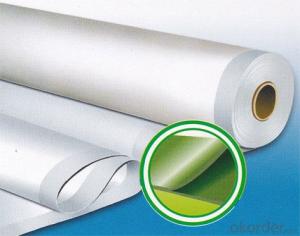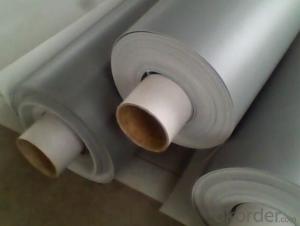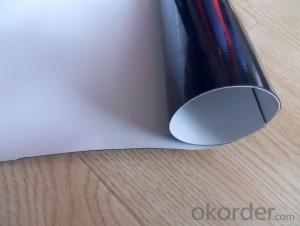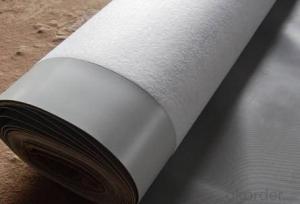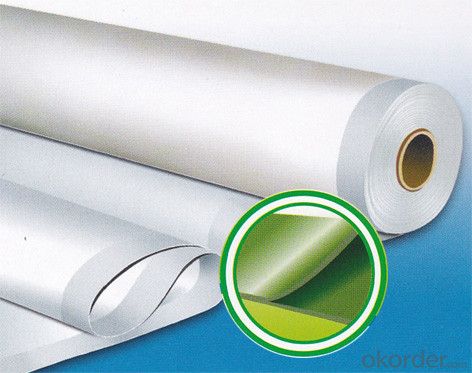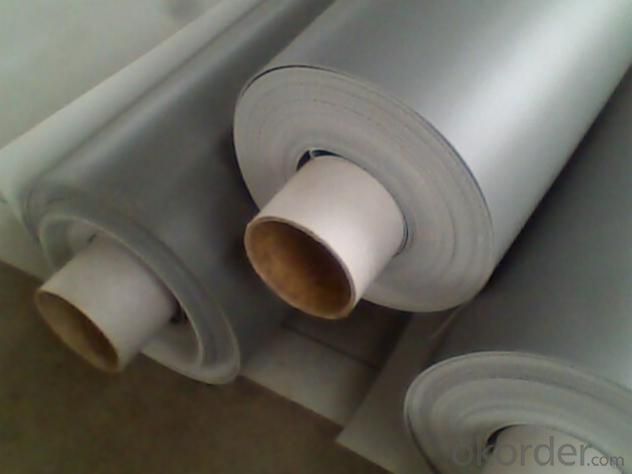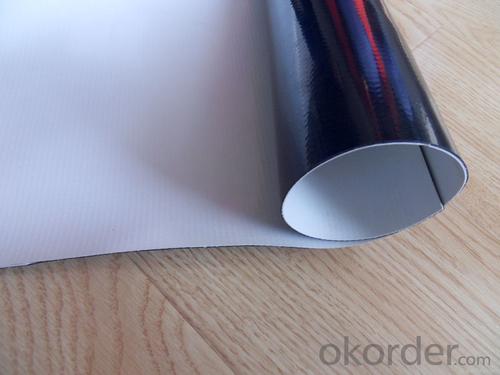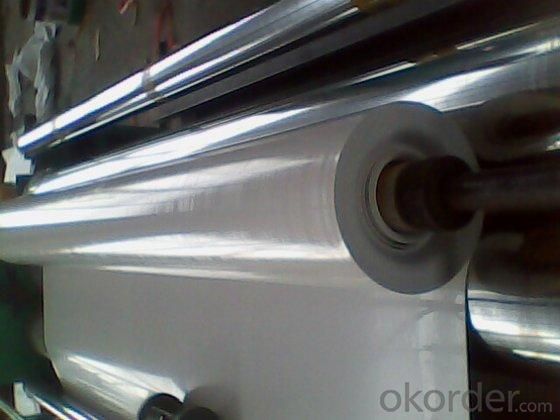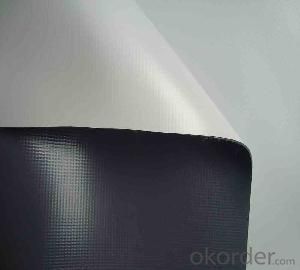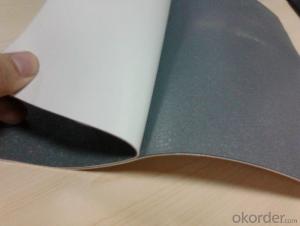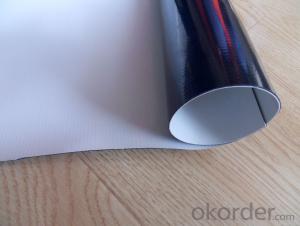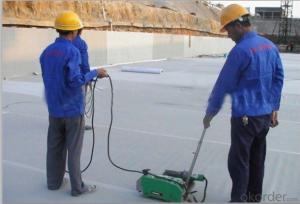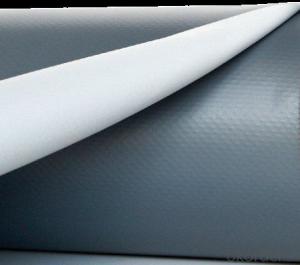PVC Waterproofing Sheet in Polyester Reinforcement with Custom Thickness
- Loading Port:
- Shanghai
- Payment Terms:
- TT OR LC
- Min Order Qty:
- 20000 m²
- Supply Capability:
- 5000000 m²/month
OKorder Service Pledge
OKorder Financial Service
You Might Also Like
PVC Waterproofing Sheet in Polyester Reinforcement with Custom Thickness
Product Description of PVC Waterproofing Sheet in Polyester Reinforcement with Custom Thickness:
PVC Membrane Waterproof /Waterproofing membrane For Roof is a new polymer waterproof membrane. The PVC Membrane Waterproof /Waterproofing membrane For Roof raw material is polyvinyl chloride resin, mixed with plasticizer, filler, antioxygen, ultraviolet absorber and other auxiliaries.
Thickness: 1.2mm/1.5mm/1.8mm/2.0mm
Width:2050mm
Length:20m( Special specifications can be customized)
Size: 2.05mx20m
Color: white/grey, or any other colors.
Features of PVC Waterproofing Sheet in Polyester Reinforcement with Custom Thickness:
1. Excellent anti-aging property.
2. Puncture- resistant.
3. Welding construction,
4. High tensile strength, good elongation, good dimensional stability.
5. Good plasticity.
6. It has self-extinguishing from fire property.
7. Materials surface is smooth, fast color, stain resistance.
8. More wide, Wastage become less when being used.
Classification of PVC Waterproofing Sheet in Polyester Reinforcement with Custom Thickness:
1. N: Homogeneous PVC membrane
2. L: PVC membrane with fabric backing
3. W: Reinforced PVC membrane
Advantage of PVC Waterproofing Sheet in Polyester Reinforcement with Custom Thickness:
1.) Mixing automation. Apply automatic temperature control automatic time control and automatic feed control.
2.) Extrusion equipment uses twin screw coextrusion. Screw temperature uses computer automatic temperature control system.
3.) Handpiece uses large width didhead extrusion equipment.
4.) Sophisticated three-roller calender equipment. The space between equiment is controlled by automation system.
Technical Data of PVC Waterproofing Sheet in Polyester Reinforcement with Custom Thickness:
No. | Item | Model Ⅱ | |
1 | Tensile Strength Mpa ≥ | 12.0 | |
2 | Elongation at break% ≥ | 250 | |
3 | Shrinkage rate % ≤ | 2.0 | |
4 | Flexibility at low temperature | No crackle at -25oC | |
5 | Water tightness | Watertight | |
6 | Puncture resistance | Watertight | |
7 | Heat aging treatment | Appearance | Free from bubble, crack, cohesion and void |
Change rate of tensile strength % | +20oC | ||
Change rate of elongation at break | |||
Flexibility at low temperature | No crack at -20oC | ||
8 | Chemical corrosion resistance | Change rate of tensile strength % | +20 |
Change rate of elongation at break | |||
Flexibility at low temperature | No crack at -20oC | ||
9 | Artificial weathering | Change rate of tensile strength % | +20 |
Change rate of elongation at break | |||
Flexibility at low temperature | No crack at -20oC | ||
Application of PVC Waterproofing Sheet in Polyester Reinforcement with Custom Thickness:
1) All kinds of roofs, such as steel structure roof, planted roof etc.
2) Underground engineering, such as building basement, subways, tunnels, air raid shelter, etc.
3) Other projects like artificial lake, dam, water reservoir, grain storehouse, etc.
Images of PVC Waterproofing Sheet in Polyester Reinforcement with Custom Thickness:
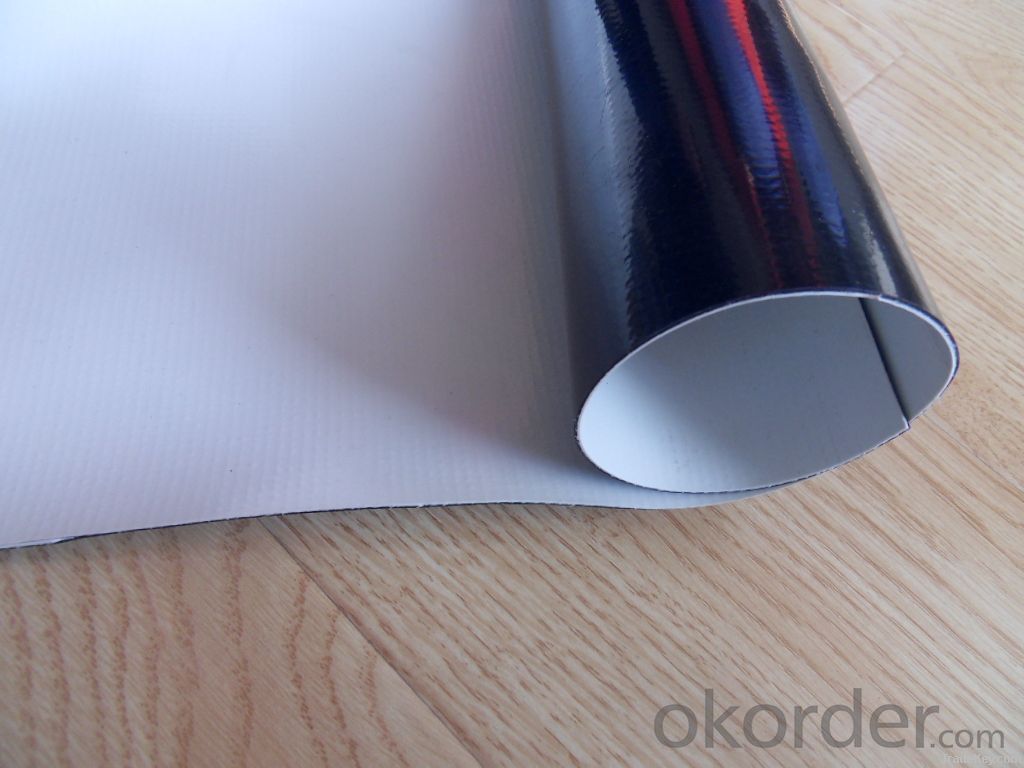
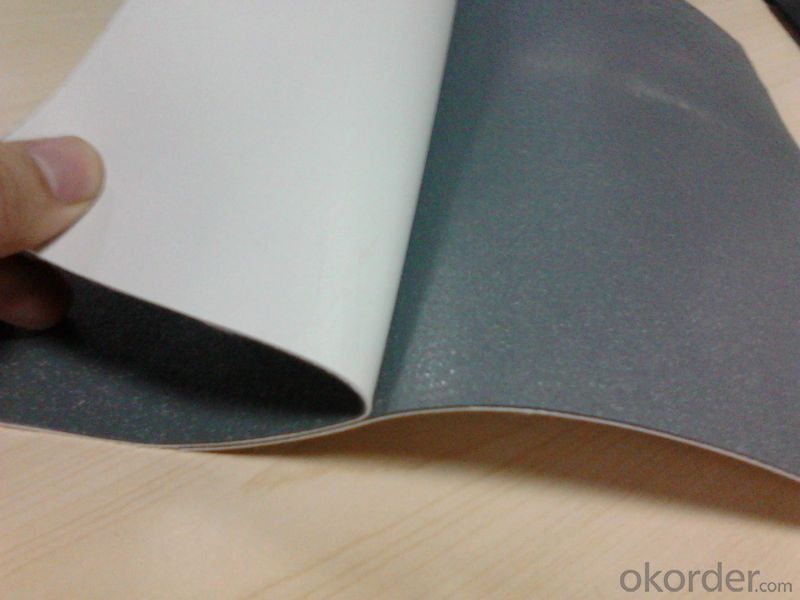
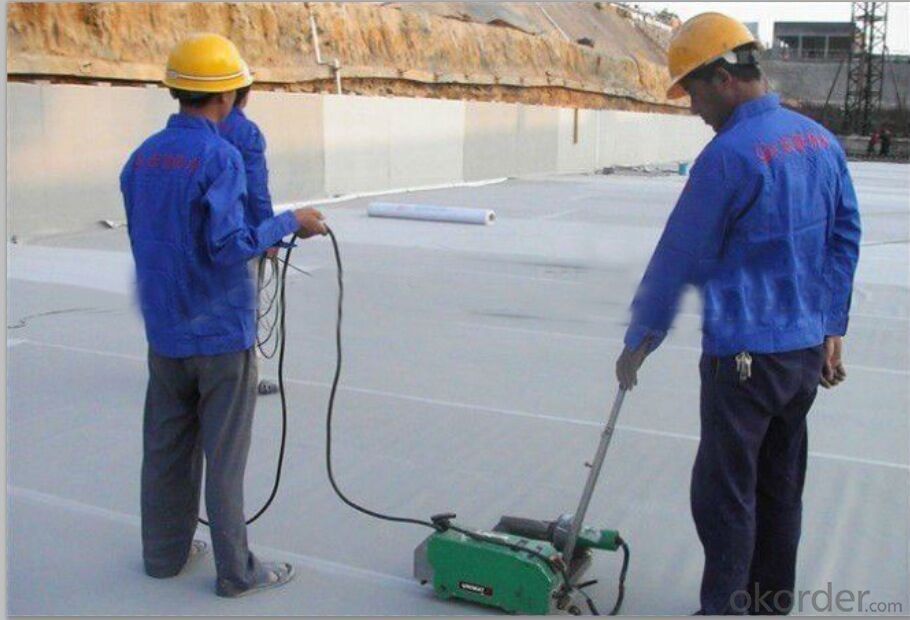
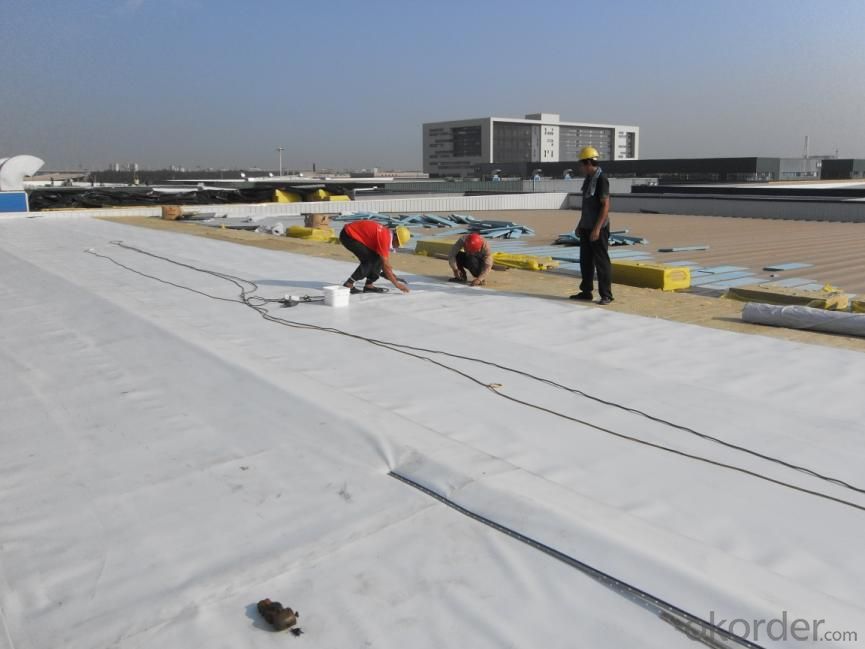
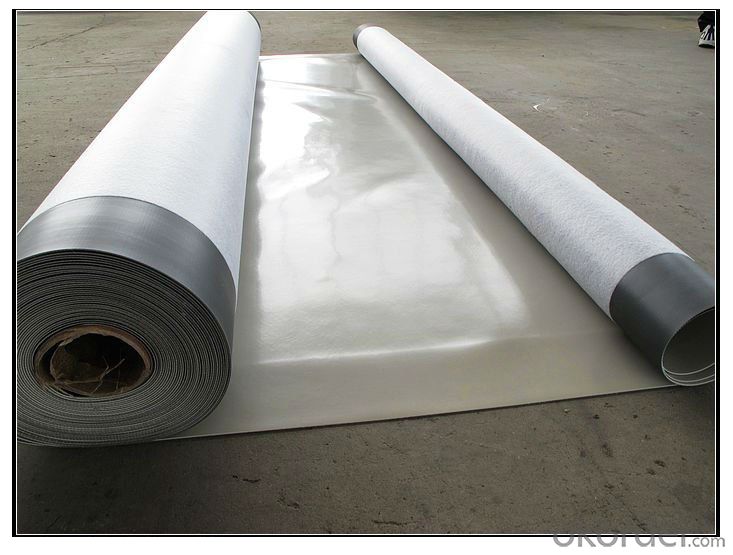
FAQ:
1. Can you produce 4m width?
Yes, no problem for us. We have four bases in China, largest one in this field.
2. How many quantity in one 20'' container for 1.2mm and 1.5mm?
480rolls, 11520m2 for 1.2mm and 400rolls, 9600m2 for 1.5mm
3. Can you provide free samples?
Yes, our samples are free, but express fees usually on buyer's account.
- Q: Are waterproofing membranes suitable for balconies and terraces?
- Yes, waterproofing membranes are suitable for balconies and terraces as they provide an effective barrier against water infiltration, protecting the underlying structure from potential damage caused by moisture.
- Q: Can a waterproofing membrane be used in areas with high foot traffic or heavy loads?
- Yes, a waterproofing membrane can be used in areas with high foot traffic or heavy loads. Waterproofing membranes are designed to provide a protective barrier against water infiltration and can withstand various types of stress, including foot traffic and heavy loads. However, it is important to choose a waterproofing membrane that is specifically designed for these conditions. There are different types of membranes available, each with varying levels of durability and strength. It is crucial to consult with a professional waterproofing expert or manufacturer to ensure that the chosen membrane is suitable for the specific requirements of the area with high foot traffic or heavy loads. Proper installation and maintenance of the membrane are also essential for its long-term effectiveness in these conditions.
- Q: Can a waterproofing membrane be used on tunnels with subway systems?
- Tunnels with subway systems can indeed benefit from the use of a waterproofing membrane. It is strongly advised to incorporate this protective layer into subway tunnel construction to prevent water infiltration and potential harm to the structure and electrical systems. The waterproofing membrane acts as a barrier, effectively excluding water and safeguarding the tunnel against issues caused by moisture, such as corrosion, mold, and deterioration. It is crucial to select a waterproofing membrane that is specially designed for tunnel use and capable of withstanding the unique challenges and conditions of subway systems, including heavy traffic loads, vibrations, and exposure to chemicals. Moreover, it is essential to ensure the installation of the waterproofing membrane is carried out by experienced professionals who adhere to the appropriate guidelines and specifications, guaranteeing its effectiveness and durability.
- Q: Does a waterproofing membrane prevent mold and mildew growth?
- Indeed, the growth of mold and mildew can be prevented with the aid of a waterproofing membrane. These fungi flourish in environments characterized by dampness and moisture, but a waterproofing membrane acts as a barrier, thwarting the infiltration of water into the treated surfaces. By keeping moisture at bay, it diminishes the circumstances that facilitate the proliferation of mold and mildew. Nonetheless, it is crucial to acknowledge that while a waterproofing membrane is effective in preventing such growth, it does not ensure absolute protection. Adequate ventilation and consistent upkeep are also imperative in the battle against mold and mildew.
- Q: Does a waterproofing membrane provide any insulation against heat or cold?
- A waterproofing membrane, in itself, does not offer any insulation against heat or cold. Its primary purpose is to stop water infiltration into the building, but it lacks the ability to regulate temperature. Temperature control is usually accomplished by incorporating separate materials like foam boards, fiberglass, or other thermal barriers alongside the waterproofing membrane. These additional elements provide thermal resistance and regulate temperature.
- Q: Can a waterproofing membrane be used on precast aluminum surfaces?
- Yes, a waterproofing membrane can be used on precast aluminum surfaces. The membrane forms a protective layer that prevents water penetration, ensuring the durability and longevity of the precast aluminum surfaces.
- Q: Does a waterproofing membrane have any impact on the appearance of a surface?
- Yes, a waterproofing membrane can have an impact on the appearance of a surface. When applied to a surface, such as a wall or floor, the waterproofing membrane creates a barrier that prevents water or moisture from penetrating the surface. This often involves applying a coating or layer that can alter the texture or sheen of the surface. In some cases, the membrane may cause a slight color change or darken the surface. However, there are also transparent or colorless waterproofing membranes available that do not significantly alter the appearance of the surface. Ultimately, the impact on appearance will depend on the type of waterproofing membrane used and the desired aesthetic outcome.
- Q: Can a waterproofing membrane be used in balconies or decks?
- Yes, a waterproofing membrane can be used in balconies or decks to protect the underlying structure from water damage and ensure a longer lifespan for the outdoor space.
- Q: Can a waterproofing membrane be used on precast stone block surfaces?
- Yes, a waterproofing membrane can be used on precast stone block surfaces. A waterproofing membrane is designed to provide a protective barrier against water infiltration, and it can be applied to various surfaces, including precast stone blocks, to prevent water damage and ensure the longevity of the structure.
- Q: What are the different thickness options for a waterproofing membrane?
- Waterproofing membranes are available in a range of thicknesses to accommodate different needs and uses. Typically, the thickness of a waterproofing membrane can vary from 0.5 mm to 2.0 mm. For applications that require a flexible and lightweight solution, thinner waterproofing membranes, measuring between 0.5 mm and 0.8 mm, are often utilized. These membranes are commonly employed in residential waterproofing projects, such as roof decks, balconies, and basements. Additionally, they are suitable for areas with minimal foot traffic or limited space, as their thin profile allows for easy installation and minimal disruption to the existing structure. In both residential and commercial applications, medium-thickness waterproofing membranes, ranging from 1.0 mm to 1.5 mm, are frequently used. These membranes offer a balance between flexibility and durability, making them appropriate for areas that may experience moderate to heavy foot traffic or require additional protection. Common areas of application include shower enclosures, wet rooms, and exterior walls. Thicker waterproofing membranes, typically measuring 1.5 mm to 2.0 mm, are often preferred for high-demand applications or areas exposed to extreme conditions. These membranes provide enhanced strength, resilience, and resistance to punctures and abrasions. They are commonly utilized in industrial settings, commercial buildings, and civil engineering projects, such as tunnels, bridges, and parking structures. It is important to note that the appropriate thickness option for a waterproofing membrane depends on specific project requirements, including anticipated usage, exposure to moisture, and expected loads. Therefore, it is advisable to consult with a professional or manufacturer to determine the most suitable thickness option for a particular application.
Send your message to us
PVC Waterproofing Sheet in Polyester Reinforcement with Custom Thickness
- Loading Port:
- Shanghai
- Payment Terms:
- TT OR LC
- Min Order Qty:
- 20000 m²
- Supply Capability:
- 5000000 m²/month
OKorder Service Pledge
OKorder Financial Service
Similar products
Hot products
Hot Searches
Related keywords
